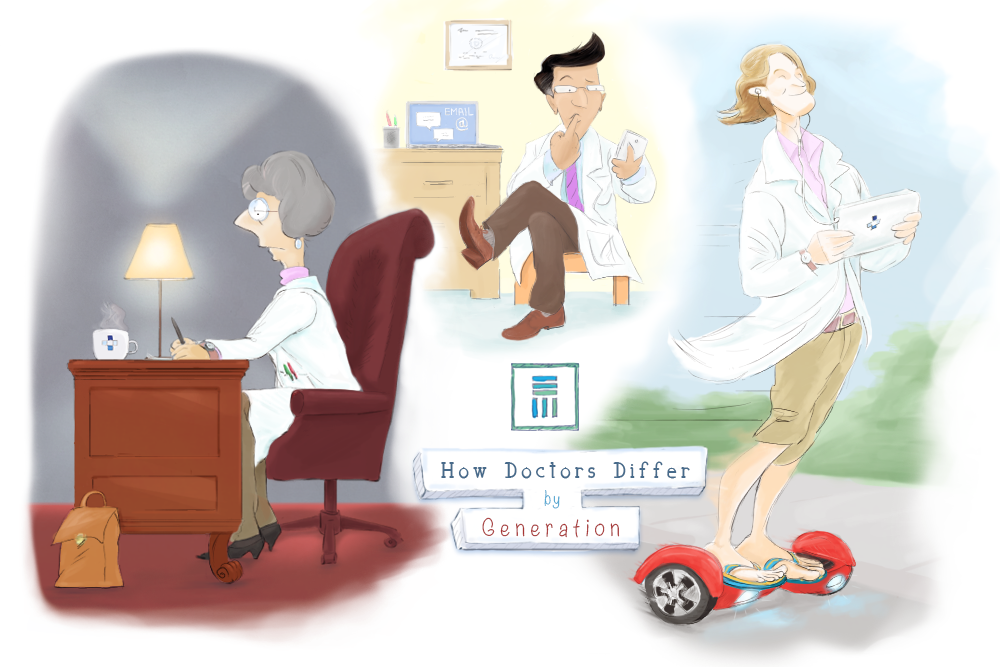In health care today, it’s not uncommon to find four generations working together. Baby Boomers and even some pre-Boomers occupy many of the leadership positions in hospitals and medical practices, but are rapidly reaching retirement age. Many Generation X physicians are moving into leadership roles, but shun the “workaholic” tendencies of older doctors in favor of the work-life balance prized by younger generations. And while Generation Y, also known as Millennials, often get a bad rap for not being team players, they are also the largest generation – more than 80 million strong – and the most comfortable with technology.
With a doctor shortage looming as older practitioners retire, and as competition for new employees increases, “generational differences can’t be brushed aside” any longer, states Hospitals & Health Networks (H&HN) magazine, which dedicated a bimonthly series to the issue: “Generations in the Workplace.” Doctors and health care professionals of all ages must begin to understand each other’s differences, recognize each other’s strengths, and learn to work together.
Baby Boomers: hard-working, slow to change
Baby Boomers (born between 1946-1964) are a growing population that presents a particular challenge for health care on both sides of the doctor-patient equation. The loss of Boomer-age providers combined with the growth in the number of elderly patients will tax an already-stressed health care system.
Health care recruiter Christine Ricci tells H&HN that when she gives talks to organizations on generational diversity, she uses three prototypical people to illustrate the differences among workers of various generations. A typical Baby Boomer might be “a hospital CEO who’s very loyal, probably having worked for only three organizations during her career. She’s at the office from 6 in the morning until 7 at night. She values her benefits: health insurance, life insurance, long-term care and vacation.”
Baby Boomers are often stereotyped as “workaholics” and “pay-your-dues” vocation-driven doctors by their younger colleagues, as Gen-X doctor Sherwin Gallardo, M.D., writes on KevinMD.com. “We revered the Boomer generation for their endless, tireless work, when medicine was still a calling, and the answer to every problem was to work harder, no matter the sacrifice.”
However, that viewpoint may be changing along with the health care environment. Gallardo has seen Boomer doctors retire “in droves” due to increased bureaucracy, billing and coding requirements, and the demands of EHRs. Boomers’ willingness to adopt new and improved technology could ease the burdens on both them and the overall health care system.
Generation X: caught between work and life demands
Gen-X doctors (born in the mid-1960s to the early 1980s) are straddling the generational divide between their Boomer and Millennial colleagues. They don’t want to work themselves into the ground like their mentors may have. Increasing rates of doctor burnout may be the wakeup call they need to adopt the healthier attitude toward work-life balance held by their younger colleagues — whom they may once have “chided” for their perceived lack of work ethic, admits Gallardo.
Ricci’s prototypical Gen-Xer works in the office from eight to five. But that Boomer loyalty isn’t necessarily there, since this generation has seen the toll it took on their parents. Gen-Xers respond well to financial incentives and small tokens of appreciation, according to Ricci.
Gen-Xers would prefer to trade the culture of burnout for one of self-care and wellness, writes Gallardo. And they want to find ways to better manage the demands of scheduling, billing, charting, and other administrative burdens so they can get back to “why we went to medical school in the first place: our patients.”
Millennials: digital natives, must learn when to disconnect
Millennials (born in the early 1980s to the early 2000s) are the largest of any of these generations. These “digital natives” were practically born with smartphones in their hands, and relate to nearly everything in their lives through technology. Ricci describes the prototypical Millennial doctor as having “the phone in hand, the iPad in her briefcase, she’s typing on her handheld phone and, at the same time, she’s got the earbud on. … That’s quite different from how the boomer may operate.”
This connectivity makes up for the fact that Millennials want shorter office hours, say, 9 to 4:30, and greater flexibility. “If [a Millennial doctor] needs to leave work mid-morning to drive his mother to the airport, he expects to be allowed to do that,” says Ricci. This generation may be just as productive as their older colleagues who work longer hours, because they know how to leverage technology to increase productivity.
While older doctors can learn a great deal about technology and work-life balance from Millennials, the younger generation can learn from their more experienced colleagues, as well. For instance, relying too much on devices can sometimes hinder face-to-face communication. Additionally, “their informality — including tattoos, piercings, and in one case … a sweatsuit worn to an interview — might need to be reined in so they don’t scare off the older patients,” states H&HN.
When it comes to recruiting and retaining Millennials, health care organizations often falsely assume financial compensation is most important. In fact, this generation values an engaging, collaborative work environment, flexibility, and variety in their jobs above salary and benefits.
How to foster connection and collaboration
Mentoring can have benefits for all those involved. That includes formal arrangements or gatherings hosted by professional organizations, but less structured interactions can be equally beneficial if they allow doctors of different generations to get to know each other and connect on both a personal and professional level.
“It may be difficult to find the time, so you have to look for opportunities,” C.J. Bolster, vice president and leader of the national health care practice at the Hay Group consulting firm, told H&HN. Bolster sees long car rides as an excellent mentoring opportunity.
Boomers and Gen-Xers have a lot of life experience to impart, and Millennials bring new tools and perspective to the table. With some awareness and a little effort, you can harness the skills and knowledge of each generation to benefit your practice, your patients, and ideally, health care overall.
For more tips on working with different generations in your practice, see H&HN’s article, 8 Tips to Manage Staff Across the Ages. And for more articles about practice management, see our blog archives.

